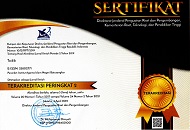Cultural Values of Education at the Sumatra Thawalib Islamic Boarding School Parabek, Bukittinggi
Abstract
Keywords
Full Text:
PDFReferences
Al-Haimer Al-Merri, A. S. S., & Irtaimeh, H. J. (2020). Cultural Values on Continuous Improvement in Private Schools in Kuwait. International Journal of Business and Management, 15(5), 37. https://doi.org/10.5539/ijbm.v15n5p37
Amtu, O., Makulua, K., Matital, J., & Pattiruhu, C. M. (2020). Improving student learning outcomes through school culture, work motivation and teacher performance. International Journal of Instruction, 13(4), 885–902. https://doi.org/10.29333/iji.2020.13454a
Anggraini, S., Fahmi, D., Sakinah, A., Sulaiman, H., Fahreza, I., Studi, P., … Medan, S. U. (2022). Implementasi Budaya Organisasi di Sekolah Menengah Pertama ( Studi Kasus di SMP Al Washliyah 42 Berastagi ). Jurnal Manajemen Pendidikan, 6(3), 13539–13547.
Baker, H. (2017). The management of school phobia. Intervention with Children, (April), 152–170. https://doi.org/10.4324/9781315231907
Carpenter, D. (2015). School culture and leadership of professional learning communities. International Journal of Educational Management, 29(5), 682–694. https://doi.org/10.1108/IJEM-04-2014-0046
Eger, L., & Prášilová, M. (2020). the Relation Between School Culture Sub-Categories and Expected Results of Learning Process. Problems of Education in the 21st Century, 78(1), 48–60. https://doi.org/10.33225/pec/20.78.48
Glusac, D., Tasic, I., Nikolic, M., Terek, E., & Gligorovic, B. (2015). A study of impact of school culture on the teaching and learning process in Serbia based on school evaluation. Nastava i Vaspitanje, 64(2), 255–268. https://doi.org/10.5937/nasvas1502255g
Hadiyanto, H. (2015). Integrasi Pendidikan Karakter Di Smp Pondok Pesantren Modern Nurul Ikhlas Kabupaten Tanah Datar Sumatera Barat. Pedagogi: Jurnal Ilmu Pendidikan, 15(2), 87. https://doi.org/10.24036/pedagogi.v15i2.5834
Haeruddin, H., Rama, B., & Naro, W. (2019). Implementasi Pendidikan Karakter di Pondok Pesantren An- Nurîyah Bonto Cini’ Kabupaten Jeneponto Provinsi Sulawesi Selatan. Jurnal Pendidikan Agama Islam Al-Thariqah, 4(1), 60–73. https://doi.org/10.25299/al-thariqah.2019.vol4(1).3203
Hambali. (2014). Globalisasi dan Pendidikan Pesantren. Jurnal Al-Ta’lim, 13(2), 213–234.
Ismawati, Y., Rahmah, A., Fathi, M. N., Jamaliyah, R., Rahmadani, A. L., & Arfinanti, N. (2020). Budaya Organisasi Sekolah Dalam Mempersiapkan Sumber Daya Manusia Unggul. Jurnal Administrasi Dan Manajemen Pendidikan, 3(1), 118–122. https://doi.org/10.17977/um027v3i22020p118
Jamaluddin, M. (2012). Metamorfosis Pesantren di Era Globalisasi. Karsa, 20(1), 127–139.
Jumadan. (2017). Budaya Organisasi pada Lembaga Pendidikan Islam. Shautut Tarbiyyah, 36, 2.
Karlina, E., Martiwi, R., & Suharyadi, D. (2018). Pengaruh Budaya Organisasi Terhadap Efektivitas Sekolah (Studi kasus pada SDN 1 Karangsari Waled Cirebon). Widya Cipta, FII(1), 83–90.
Kaufman, E. K., Cash, C. S., Coartney, J. S., Ripley, D., Guy, T. M., Glenn, W. J., … Anderson II, J. C. (2019). Planning to Create a Culture of Continuous Improvement with the Department of Defense Education Activity. Educational Planning, 26(4), 5–19.
Khoiri, M. (2020). Pengembangan Pendidikan Agama Berbasis Budaya Sekolah dalam Mengatasi Problematika Pendidikan Agama. Tarlim : Jurnal Pendidikan Agama Islam, 3(1), 39–50. https://doi.org/10.32528/tarlim.v3i1.2869
Khoiri, Q. (2019). Globalisasi Dan Respon Pesantren. Nuansa, 12(1), 94–106. https://doi.org/10.29300/nuansa.v12i1.2170
Nadur, E. S. (2017). Implementasi kepemimpinan transformasional kepala sekolah dalam membentuk budaya sekolah pada konteks pendidikan di indonesia. Jurnal Penelitian., 21(1), 48–61.
Narayan, N. A. (2016). Culture of school improvement: Exploring its existence and effectiveness. Saudi Journal of Humanities and Social Sciences, 1(3). https://doi.org/10.21276/sjhss.2016.1.2.1
Rauf, P., Ali, S., Aluwi, A., & Noor, N. (2014). The Effect of School Culture on the Management of Professional Development in Secondary Schools in Malaysia. Malaysian Online Journal of Educational Sciences, 2(3), 41–52.
Rony, R. (2021). Urgensi Manajemen Budaya Organisasi Sekolah Terhadap Pembentukan Karakter Peserta Didik. Tafkir: Interdisciplinary Journal of Islamic Education, 2(1), 98–121. https://doi.org/10.31538/tijie.v2i1.26
Safrizal, S., Yulia, R., Nurhafizah, N., & Husnani, H. (2022). Analysis of Guru Penggerak Programs as Sustainable Professional Development for Teachers. Al-Ishlah: Jurnal Pendidikan, 14(2), 2135–2142. https://doi.org/10.35445/alishlah.v14i1.829
Safrizal, S., Yulia, R., & Suryana, D. (2021). Difficulties of Implementing Online Learning in Kindergarten During Pandemic ; Teacher ’ s Perspective Review. Jurnal Pendidikan Dan Pengajaran, 54(3), 406–414.
Salfi, N. A., & Saeed, M. (2007). Relationship among school size, school culture and students’ achievement at secondary level in Pakistan. International Journal of Educational Management, 21(7), 606–620. https://doi.org/10.1108/09513540710822201
Sapariah, S. (2017). Efektivitas Budaya Organisasi dalam Meningkatkan Prestasi Sekolah (Studi Kasus di Sekolah Menengah Kejuruan Negeri 1 Ciamis). Jurnal Ilmiah Mahasiswa Pascasarjana Administrasi Pendidikan, 5(1), 87–95.
Siregar, F. R. (2018). Nilai-Nilai Budaya Sekolah dalam Pembinaan Aktivitas Keagamaan Siswa SD IT Bunayya Padangsidimpuan. Jurnal Kajian Gender Dan Anak, 1(1). https://doi.org/10.24952/gender.v1i1.777
Suryana, D., Yulia, R., & Safrizal, S. (2021). Model of Questioning Skill Teacher for Developing Critical Thinking Skill in Early Childhood Education in West Sumatra , Indonesia. 21(May), 101–114. https://doi.org/10.12738/jestp.20212.007
Suryanti, E. W. (2018). Pengembangan budaya organisasi di sekolah. Jurnal Ilmiah Fakultas Keguruan Dan Ilmu Pendidikan, 19, 1–12.
Syamsuri, H. (2013). Budaya Organisasi Di Sekolah. Jurnal Pemikiran Keislaman, 22(1), 182–187. https://doi.org/10.33367/tribakti.v22i1.56
Widodo, H. (2017). Manajemen Perubahan Budaya Sekolah. Manageria: Jurnal Manajemen Pendidikan Islam, 2(2), 287–306. https://doi.org/10.14421/manageria.2017.22-05
Wulandari, P., & Nugroho, P. J. (2020). Pengembangan Budaya Organisasi Sekolah Unggul Swasta. Jurnal Manajemen Dan Supervisi Pendidikan, 4(3), 240–248. https://doi.org/10.17977/um025v4i32020p240
Zabat, M. J., Balila, J. S., Suyasa, P. T. S., Rostiana, Dorado, L., & Heng, P. H. (2021). School Culture and Management Functions as Correlated to Teachers’ Job Satisfaction in selected ASEAN Elementary Schools. Proceedings of the International Conference on Economics, Business, Social, and Humanities (ICEBSH 2021), 570(Icebsh), 1351–1358. https://doi.org/10.2991/assehr.k.210805.212
DOI: http://dx.doi.org/10.31958/jt.v26i1.9008
Refbacks
- There are currently no refbacks.
Copyright (c) 2023 Muhammad Fazis

This work is licensed under a Creative Commons Attribution-NonCommercial 4.0 International License.
TA'DIB with registered number e-ISSN: 2580-2771, p-ISSN: 1410-8208 have been indexed on:

Journal Ta'dib distribute under Lisensi Creative Commons Atribusi-NonKomersial 4.0 Internasional.
Contact us: Ta'dib; Address: FTIK, Universitas Islam Negeri Mahmud Yunus Batusangkar; Jl. Sudirman No. 137 Lima Kaum Batusangkar, Tanah Datar, Sumatera Barat, Indonesia. Email: takdib@uinmybatusangkar.ac.id

























